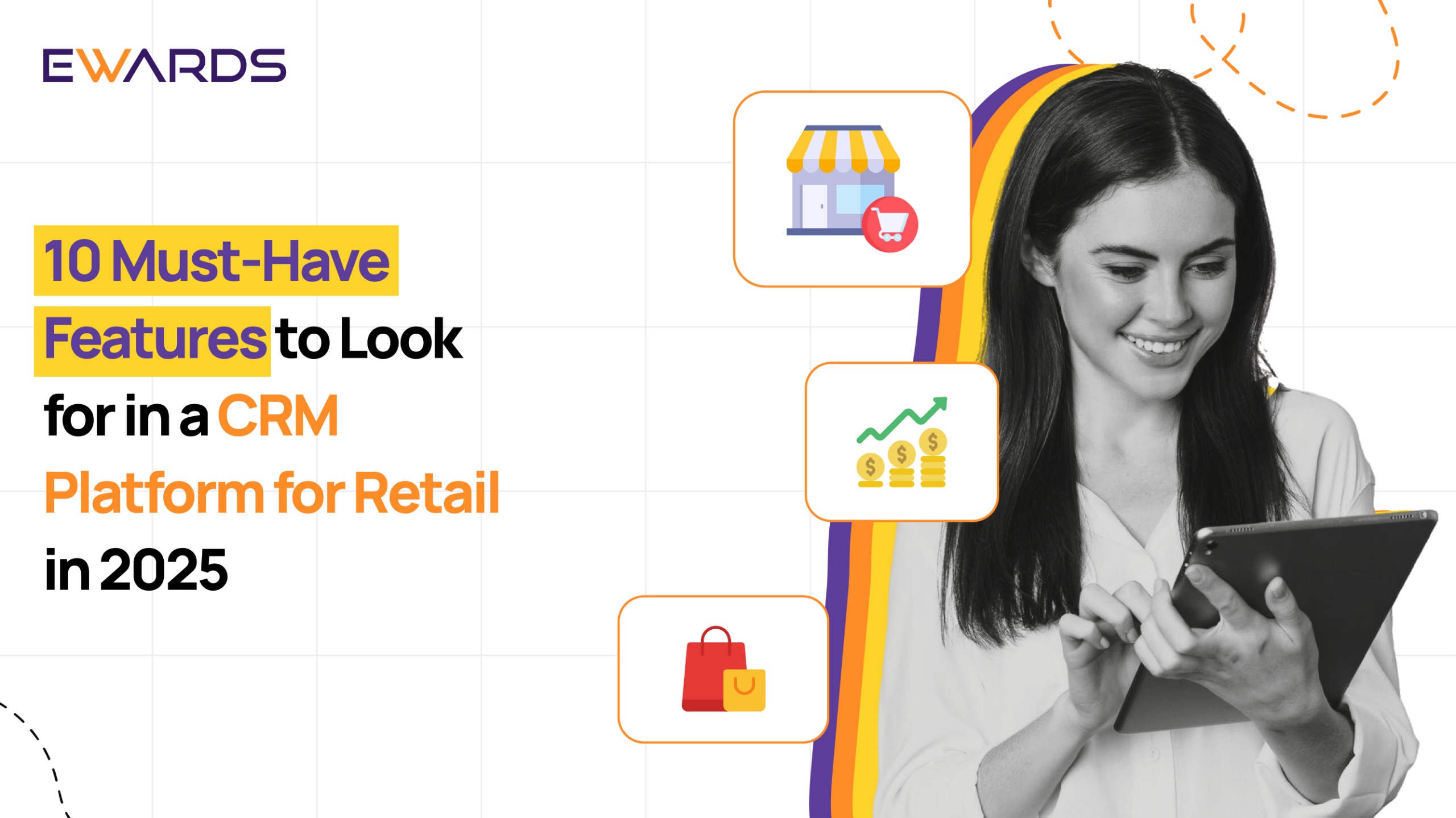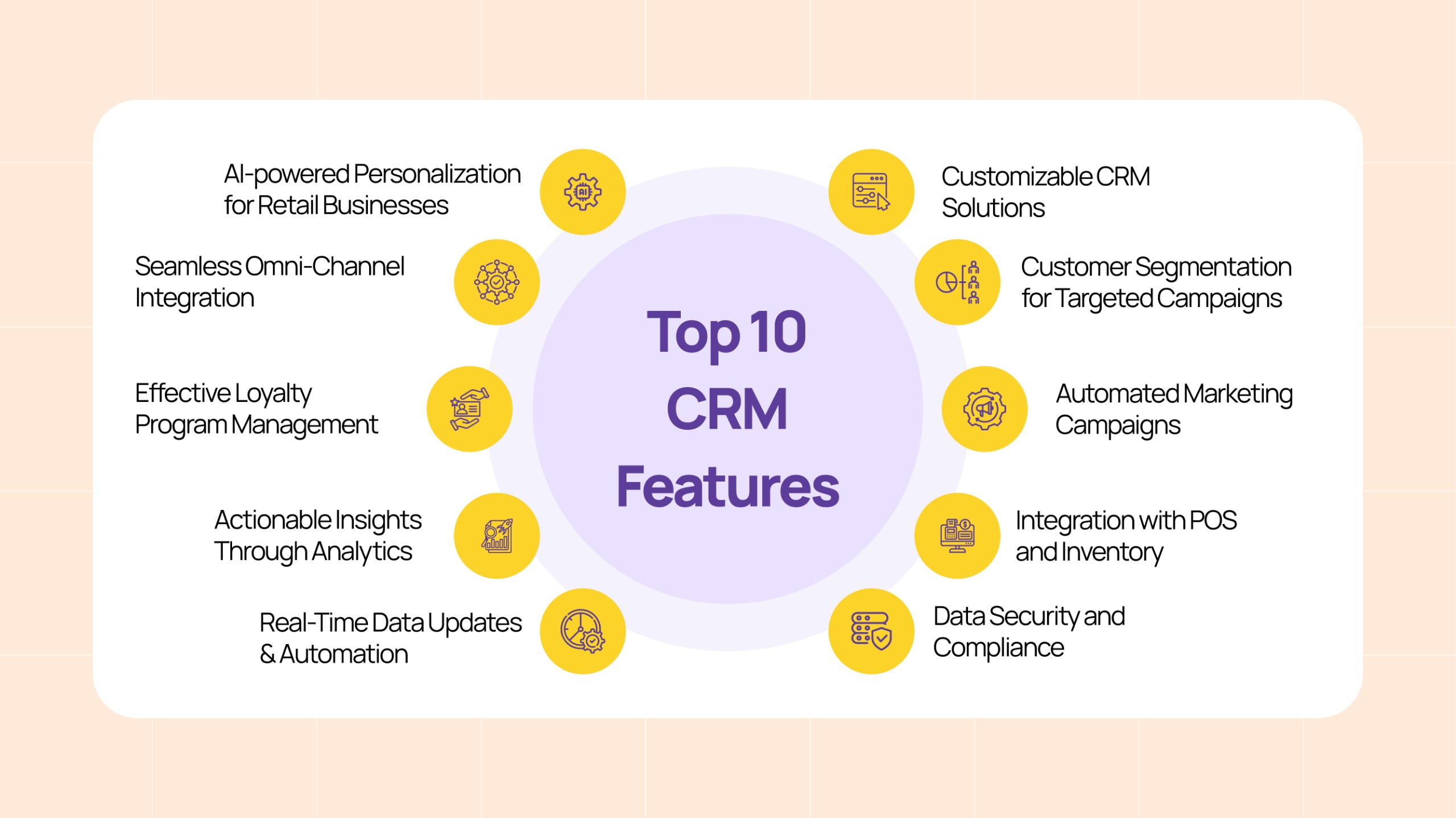
Customer relationships are the core of your success for any and every business. With decades of experience in the industry, you must have seen firsthand how critical it is to stay ahead of the curve when it comes to managing customer interactions. Thus, in 2025, having the right Customer Relationship Management (CRM) system is important. A CRM platform should be able to manage customer data. It should empower you to provide personalized experiences, streamline operations, and boost customer loyalty.
Let’s explore the features that you should look for in CRM software.
Top 10 CRM Features

- AI-powered Personalization for Retail Businesses
According to the latest stats from Epsilon, 80% of consumers are more likely to purchase from a brand that offers personalized experiences. With AI-powered personalization in your CRM, you can create individualized offers based on customer behavior, purchase history, and preferences. This personalization can be as simple as recommending products that a customer is likely to buy next or sending tailored promotions for their birthday.
For instance, brands like Amazon and Netflix use AI to analyze user data and provide personalized recommendations.
- Seamless Omni-Channel Integration
Invoca stats suggest that 73% of retail consumers use multiple channels to make a purchase. A seamless integration across all touchpoints makes sure that your customer experiences are smooth, no matter where they interact with your brand. Therefore, your CRM software should unify customer data from all channels, whether they’re engaging with your brand online, on social media, or in-store.
Starbucks integrates customer data across its app, loyalty program, and in-store experience. By tracking purchases made through their app and syncing them with in-store interactions, they offer personalized rewards and promotions, improving customer satisfaction and driving repeat business.
- Effective Loyalty Program Management
Customer loyalty is extremely important for repeat sales because a stat suggests that loyal customers are worth up to 10 times as much as their first purchase. Therefore, your CRM system should be able to track loyalty points and rewards and automatically trigger incentives that encourage repeat visits. This way, you can create a sustainable, long-term relationship with your customers.
Sephora’s loyalty program is a great example of how CRM-powered loyalty systems work. Through their Beauty Insider Program, customers earn points for every purchase, which can be redeemed for exclusive products or discounts. The CRM tracks these interactions to create personalized offers and increase customer retention.
- Actionable Insights Through Analytics
The Forbes article suggests that retailers that make data-driven decisions are 19 times more likely to stay profitable and 7 times more likely to retain customers. Your CRM should provide you with clear, actionable insights based on real-time customer data. This includes tracking key metrics like customer lifetime value, sales trends, and churn rates. By understanding this data, you can adjust your marketing strategies and improve customer experiences.
- Real-Time Data Updates & Automation
To thrive in the current retail industry, you would require up-to-the-minute information. Real-time data synchronization makes sure that your CRM is constantly updated, whether it’s stock levels, customer interactions, or sales data. With automation, repetitive tasks such as sending reminders or follow-ups are taken care of automatically, saving time and improving consistency.
Zara uses real-time inventory management through their CRM system. This makes sure that their customers can view stock levels in real-time across their website and in-store. When a product runs low, the system automatically adjusts inventory levels and alerts both store managers and customers, reducing the chances of missed sales.
- Customizable CRM Solutions
As your business grows, so should your CRM system. According to Statista, the global CRM market is projected to reach $89.57 billion by 2025. This growth highlights the increasing demand for flexible and scalable CRM solutions. A good CRM should allow you to scale as your business expands, accommodating new products, more customers, and additional locations.
Shopify’s CRM integrations are scalable and customizable, allowing retailers to add features as their needs evolve. Whether it’s adding new sales channels or expanding globally, it can adjust to a business’s growth trajectory without causing any issues.
- Customer Segmentation for Targeted Campaigns
Segmenting your customers based on behaviors and preferences helps you deliver more targeted marketing. CleverTap data suggests personalized email campaigns can increase conversion rates by 6x. Your CRM platform should allow you to divide your customer base into meaningful segments so that you can create tailored marketing campaigns that resonate with each group.
Nike uses customer segmentation to send highly targeted emails to its customers based on their interests and purchase behavior. For example, a customer who buys running shoes regularly will receive emails about new running gear, promotions, or fitness events, tailoring the brand’s communication to the individual’s needs.
- Automated Marketing Campaigns
According to a study by Epsilon, automated emails generate 320% more revenue than non-automated ones. With automated campaigns in your CRM, you can set up triggers for even the smallest behavior, like abandoned carts, birthday discounts, or post-purchase follow-ups. This reduces the workload on your team while making sure that communication with customers remains timely and relevant.
- Integration with POS and Inventory Systems
Retail businesses need a CRM that integrates seamlessly with Point-of-Sale (POS) and inventory management systems. This integration helps businesses track customer transactions in real time and keep inventory levels updated, leading to better stock management and improved customer service.
- Data Security and Compliance
With privacy concerns on the rise, your CRM needs to comply with regulations like GDPR and CCPA. According to CRN data, 93% of consumers are concerned about how their personal data is used. A CRM that prioritizes data security ensures that customer information is protected and your business stays compliant with the latest privacy laws.
Apple’s CRM system adheres to GDPR guidelines, ensuring that customer data is handled with the utmost care. By focusing on transparency and security, Apple has earned the trust of millions of customers worldwide, making them more likely to share their information and engage with the brand.
Conclusion
Thus, the CRM platform for retail should be a comprehensive system that helps you understand, engage, and retain your customers. With features like AI-powered personalization, seamless multi-channel integration, and robust loyalty program management, your CRM can help you optimize your business operations and boost customer satisfaction.
At eWards, we specialize in CRM solutions designed to meet the unique needs of the retail and restaurant industries. Whether it’s tracking customer behavior, automating marketing, or ensuring data security, our platform is built to help you stay ahead in a competitive market.
Talk to us to take your customer relationship to the next level.